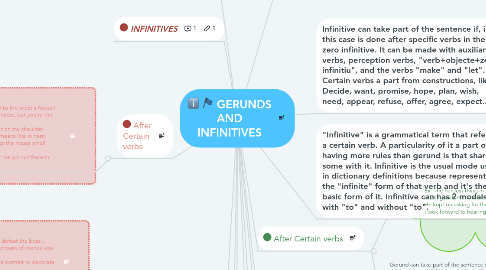:information_source: :flag_blue: GERUNDS AND INFINITIVES
by Didac a14 Jiménez Torras


1. Specific verbs [Gerunds & Infinitives]
1.1. Both infinitive and gerund can take part of the sentence if it's make with certain verbs, those therefore, have to be followed by either Infinitive or Gerund in two different ways. Changing and not changing in meaning.
2. Ex: 1- We've hated doing/to do anything out of place. Verbs like: Like, hate, love, prefer, begin, start, hate, intend, continue... 2 - Saphire stopped doing/to do parkour (She ended his pro parkourer life/She take a break in what she was doing and made a backflip). Verbs like: Remember, stop, forget, regret, try, learn, teach...
2.1. 1 - NO CHANGE IN MEANING BECAUSE OF THE VERB.
2.2. 2 - CHANGE IN MEANING BECAUSE OF THE VERB.
3. INFINITIVES
4. :led_red: After Certain verbs
4.1. Ex: 1 - Shall We go to the witch's house? I might be the mightiest, but you're the prettiest. 2 - I felt the bee sit on my shoulder. We are incredible means live in here. 3 - His clothes make the house smell horrible. My father won't let me go out there in those hours.
4.1.1. 1 - Auxiliar 2 - Perception 3 - "Make" or "Let"
5. Specific adjectives
5.1. Ex: I am disguised to be in here because I didn't pay the entry. It is determining for Federic to stay without eating anything for 3 hours.
5.2. Infinitive can take part of the sentence if it's after adjectives and it has to be used following this structure: "subjecte+to be+adjectiu+for/of+algú+infinitiu amb to". The part with "for/of" and someone it's not imprescindible. The more usual specific adjectives a part from the construction are: Easy, happy, sad and hard.
6. Talking about 'purpose'
6.1. Ex: 1 - She was here to defeat the boss... To have an incredible amount of money you must work hard. 2 - Amanda would like a portrait to decorate his house. The children in the school have a park to play in.
6.1.1. 1 - Purpose or Intention 2 - Posible use or Prevision
6.2. Infinitive can take part of the sentence if it's used to clear the pourpose or intention in an action using to like "in order to". Abd it also can be used for posible use or prevision of something and it's used with "to" following a noun/pronoun.
7. Other rules...
7.1. Ex: 1 - To be or not to be, that is the question. To held a nation, yeah, we're going that way! I asked how to cure cancer and no one answered. Isidoro cannot forget who to ask, because there's not a clear order. This is the hardcore scene to watch. This is not the correctorder to make things roll. 2 - They had better work like a team. She'd better decide who is going where. Why wait until the next week? Why move if you can stay still?
7.1.1. 1 - Infinitive with to 2 - Zero Infinitive
7.2. Infinitive with "to" can take part of the sentence if it uses "to" as subject of the phrase, also after concrete verbs followed by interrogative particles, and also to make a comment or express a opinion with the strucutre: "subjecte+to be+frase nominal+infinitiu amb to". And the Zero Infinitive used after the expression "had better", and also, without "to" but with "why" in order to make a suggerence.
8. Infinitive can take part of the sentence if, in this case is done after specific verbs in the zero infinitive. It can be made with auxiliar verbs, perception verbs, "verb+objecte+zero infinitiu", and the verbs "make" and "let". Certain verbs a part from constructions, like: Decide, want, promise, hope, plan, wish, need, appear, refuse, offer, agree, expect...
9. "Infinitive" is a grammatical term that refers to a certain verb. A particularity of it a part of having more rules than gerund is that shares some with it. Infinitive is the usual mode used in dictionary definitions because represents the "infinite" form of that verb and it's the basic form of it. Infinitive can has 2 modals with "to" and without "to".
10. Other rules...
10.1. Ex: 1 - I like going to the beach but I prefer staying in my hotel's swimming pool. In his musical video, Ed Sheeran goes running with Addidas running shoes. 2 - Do you like watching films? Try doing some fancy stuff!
10.1.1. 1 - Compound nouns 2 - Direct object
